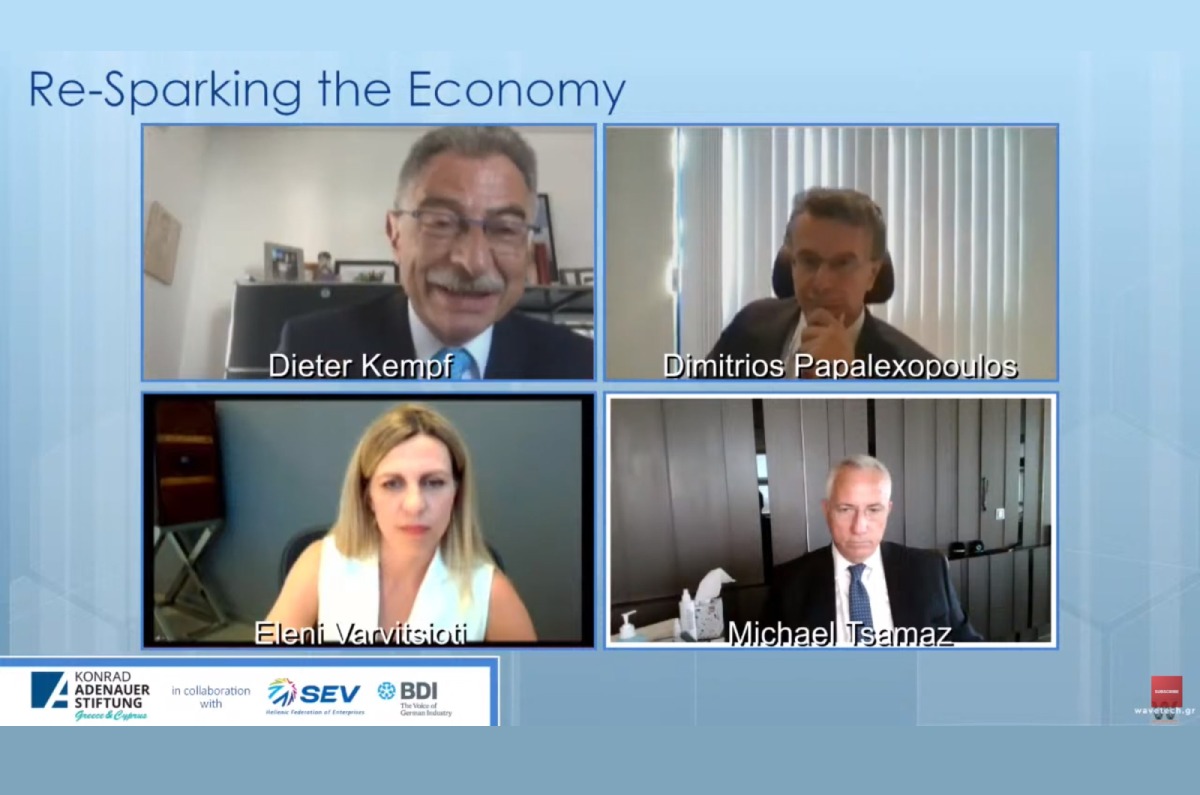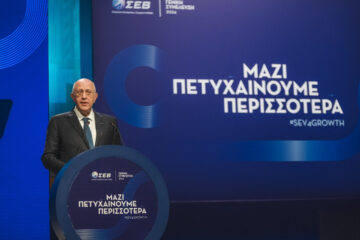E-discussion between SEV Chairman D. Papalexopoulos, and BDI President D. Kempf
The digital event on re-sparking the economy after COVID19 was organized by the Konrad Adenauer Stiftung (KAS) for Greece and Cyprus, in cooperation with SEV and BDI on June 25th. SEV – Hellenic Federation of Enterprises Chairman, Mr. Dimitris Papalexopoulos, and BDI President, Dr. Dieter Kempf, exchanged views on the growth challenges and the prospects for a V-shaped recovery in Europe and Greece. They were joined by Mr. Michael Tsamaz, Managing Director & CEO, OTE Group, and Mr. Henri-Giscard Bohnet, Director of KAS for Greece and Cyprus. The discussion was moderated by Mrs. Eleni Varvitsioti, Journalist.
The discussion focused on the way that the business communities of Greece and Germany responded to unprecedented circumstances, on the national and European instruments that have proved most effective in managing the COVID19 crisis, as well as on the policy priorities for the coming period.
Mr. Papalexopoulos underlined the need to build closer links between businesses and society, and emphasized the importance of increasing industry’s share in GDP, through more investments and speeding up the pace of reforms.
He also noted that Greece’s response to the health emergency demonstrated the very good reflexes of the public administration and citizens alike, and helped improve the country’s collective confidence creating the conditions for the country’s positive rebranding and re-alignment on the global stage. He also underlined the importance of a united Europe, and Greece’s commitment to the European vision, especially at a time our continent faced important challenges.
Mr. Papalexopoulos added that the health crisis is forcing us to think differently and to act intelligently. Greece, he said, is called to rise to the challenges of the post-Covid-19 world and to restart its economy, which despite significant progress, appears weaker than its European counterparts’ because of the long financial crisis. He stressed the need for greater consistency and speed of reforms as well as a socially responsible and effective management of EU Recovery funds.
The main priorities for a dynamic restart of the Greek economy stem from the need to strengthen its productive base through increased investment in infrastructure, with particular emphasis on digital transformation, the green and circular economy, and improving skills throughout the workforce at a time when also international supply chains are being redesigned. Mr. Papalexopoulos also highlighted the emerging investment opportunities in many key productive sectors of the Greek economy including the agro-food industry, pharmaceuticals, energy efficiency, waste management and logistics, and the growth impetus offered by the country’s valuable human capital.
Dr. Kempf noted that the European supply chains need to be redesigned taking into consideration not just economic costs but sovereignty costs as well, and stressed that the EU is the only way for Europe to remain an important global economic actor. He remarked that the current health crisis is very different from the financial crisis of 2010, and therefore the European policy response cannot be based on the same arguments as a decade ago. He underlined the need for a “Clever Green Deal”: an integrated strategy for green growth and post-COVID recovery, including substantial encouragement to SMEs for investment in digitization. Dr. Kempf warned that Europeans should remain alert to the virus, otherwise the current euphoria of dealing with the first wave may end up being self-destructive.
Click here to watch the full discussion
Click here for more information on the event





